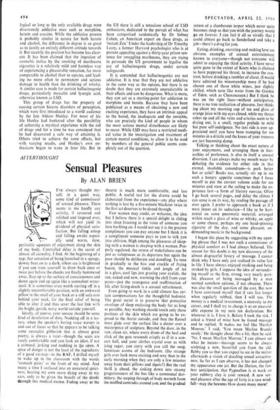MEDICINE TODAY
Instant Zen
By JOI-IN ROWAN WILSON
T ()Nice knew a man who was an alcoholic. After la while he grew alarmed at his state of health and tried to cure himself, unwisely, by taking amphetamine instead. As might have been pre-. dieted. he then became an amphetamine addict. I lost touch with him at this point, but I met him again years later in a Fleet Street pub. He had managed with great difficulty to break the am- phetamine habit and told me that he was an alcoholic again. 'It's a great relief,' he said. 'As an alcoholic you're a member of society again. You can count on some understanding, even sympathy. As a drug addict, everyone's hand is against you.'
There are several lessons in this story, apart from the obvious one that amphetamine isn't a very good treatment for alcoholism. It illustrates the fact that an important component in addic- tion is the personality of the individual con- cerned, and that a person who becomes addicted to one drug is liable to be vulnerable to others. And it gives an insight into one of the most painful aspects of addiction—the feeling of being cut off from the sympathies of one's fellow men.
The attitudes of any given society towards addiction are complex and not always logical. It is tacitly recognised that most of us. from time to time, crave for some relief from the burden of our own mental processes. In Western society, it is considered permissible to take such relief through the use of alcohol. This is regarded with tolerance so long as the drunken person is not a nuisance or a danger to others, and so long as he does not wreck his constitution by making a habit of it. The use of drugs is con- sidered to be an entirely different matter.
Such a hard-and-fast distinction seemed quite
logical so long as the only available drugs were disastrously addictive ones such as morphine, heroin and cocaine. While the addictive process is probably similar in nature for both heroin and alcohol, the difference in degree is so great as to justify an entirely different attitude towards it. But recently the position has become less clear- cut. It has been claimed that the ingestion of cannabis indica by the smoking of marihuana cigarettes is a relatively mild and harmless way of experiencing a pleasurable sensation, far more comparable to alcohol than to opiates, and lead- ing no more often to permanent and serious damage to health than the drinking of whisky. A similar case is made for certain hallucinogenic drugs, particularly mescalin and lysergic acid, otherwise known as LSD.
This group of drugs has the property of causing certain bizarre disorders of perception, which were first introduced to a world audience by the late Aldous Huxley. For most of his life Huxley had hankered after the possibility of achieving a mystical experience with the aid of drugs and for a time he was convinced that he had discovered a safe way of attaining it. Others tried to achieve the same effects, but with varying results, and Huxley's own en- thusiasm began to wane in later life. But in the US there is still a tenacious school of LSD enthusiasts, dedicated to the pursuit of what has been categorised sardonically by Dr Sidney Cohen, an American expert on these drugs, as `instant Zen.' Under the leadership of Dr Timothy Leary, a former Harvard psychologist who is at present appealing against a thirty-year prison sen- tence for smuggling marihuana, they are trying to persuade the US government to legalise the use of hallucinogenic drugs, under certain safeguards.
It is contended that hallucinogenics are not addictive. It is true that they are not addictive in the same way as the opiates, but there is no doubt that they are extremely unpredictable in their effects and can be dangerous. What is more, they can act as a starting-point for addiction to morphine and heroin. Because they have been publicised as a means of obtaining a new and exciting experience, they have an intrinsic appeal to the bored, the inadequate and the unstable, who are precisely the kind of people in whom the most serious mental disturbances are likely to occur. While LSD may have a restricted medi- cal value in the investigation and treatment of certain mental conditions, to allow it to be used by members of the general public seems com- pletely out of the question.































 Previous page
Previous page